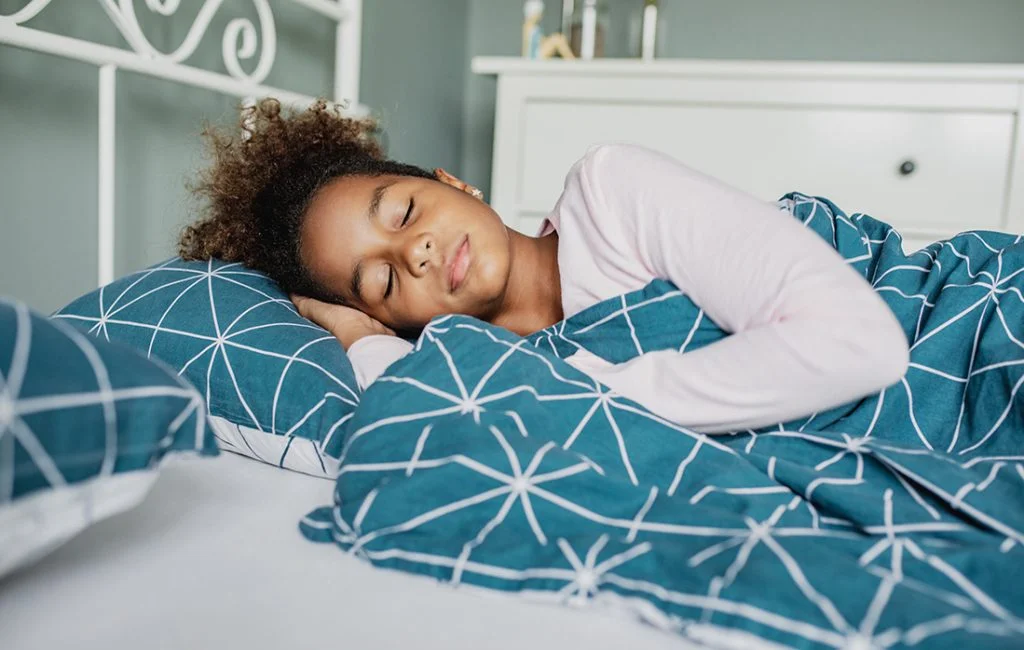
“Time for bed.” In many homes, these words are followed by lots of protesting, as kids dread bedtime like parents dread daylight savings time. But excellent sleep hygiene is being linked to more and more health outcomes, both physical and mental, for kids of all ages, increasing the focus on a “proper” bedtime. A recent study, published in September in JAMA Pediatrics, has revitalized the conversation around the impact of bedtime on the rest of a good night’s sleep. Turns out, early bedtime is linked to longer sleep durations, which provide outcomes like better health and mood.
The Findings
Parent data scientist and author Emily Oster recently took to Instagram to talk about the exciting findings in the study, that give parents concrete advice on how to help their kids get more sleep. She specifically discusses how overall, earlier bedtime interventions led to 47 more minutes of sleep, but for older kids, the results might be even more drastic: “…the largest effect involved a group of high school students. They ended up getting an additional 72 minutes of sleep with an earlier bedtime and ‘had reduced symptoms of sleepiness, anger, [low] vigor, fatigue, and confusion,’” she writes.
Oster adds in her comments to followers that just what defines an “earlier” bedtime is both relative to the child’s current bedtime, and also greatly dependent on their age (the study used participants ages 18 months to 19 years).
The Link Between Earlier Bedtimes and Sleep
Many an exasperated parent has exclaimed, “But if I put them down earlier they still wake up at the crack of dawn!” So how can researchers explain the link between earlier bedtime and longer sleep? Dr. Steven Abelowitz, Founder and Medical Director of Coastal Kids Pediatrics and Medical Director of Pediatric Associates in California, who was not involved in the study, explains.
“A young child’s circadian rhythm naturally wakes them as early as 6 to 7 am. Too late to bed time means they’ll still awake but with less sleep. Young children with a consistent routine will fall asleep faster and stay asleep longer,” he says. “ In addition, children have an increase in melatonin earlier in the evening compared to teenagers and adults.”
So the confused parents are right — their child will probably still wake up at the same time, but adding those extra zzz’s in the evening means more sleep for them overall.
How to Determine the Most Optimal Bedtime for Your Child
Paying attention to your child’s moods and behaviors can let you in on some clues about how much sleep they are getting, versus what they need. Abelowitz says, “Parents can tell they need to move bedtime earlier when the young child becomes increasingly fussy during the day, especially earlier in the day as well as when the child starts dropping their naps.” He also gives specific recommendations by age group that might help parents gauge if it’s time to hit the hay a bit sooner:
• 0 to 3 months: no recommended bedtime
• 4 to 6 months: 7:00-8:00pm
• 7 to 11 months old: 6:00-7:30pm
• 1 to 2 years old: 6:00-7:30pm
• 3 to 5 years old: 7:15-8:30pm
• 6 to 13 years old: 7:15- 9pm
But, he adds that every child is different, and these “broad” recommendations might not be a fit for your child exactly. Older teens might find their sleep duration is dictated by early wake times for school, a trend that some states are changing for improved teen health. So for teens, Nationwide Children’s recommends 13 to 18 year olds get 8 to 10 hours, which might mean counting back from that early wake up time to determine the best bedtime. They also note poor sleep health, impacting one in four children, can impact focus at school and work, and impact mood, behavior, emotional health, and even weight.
How Parents Can Help Their Kids Adjust Their Bedtime
As any parent knows, it’s way more complicated than just setting the bedtime alarm a half hour earlier — you might be met with some major resistance. Abelowitz advises that, “We do know that children thrive on a routine, so trying to avoid any major quick changes could be challenging.”
That said, as parents, you’ll know your kids best – and the best approach is going to be the one that works for you and your family. “We leave it up to the parents to decide what’s the best approach for them, i.e. gradually or incrementally,” Abelowitz says.
A bedtime change is also a great time to reevaluate sleep hygiene, and implement some other tricks and tips at the same time. Abelowitz recommends:
• Creating a consistent bedtime routine, which for younger kids might mean playtime, bath, teeth brushing, a bedtime story, or other traditions that work best for your family
• Turning off devices two hours before bedtime
• Investing in a comfortable sleeping environment, with a supportive mattress, cool and comfortable room temperature, and darkness
A note from Sleepopolis
If changing your child’s bedtime becomes more difficult than you thought, or you are worried about your child’s sleep habits, reach out promptly to their pediatrician. They can advise you on a specific routine based on your child’s needs and health.

























